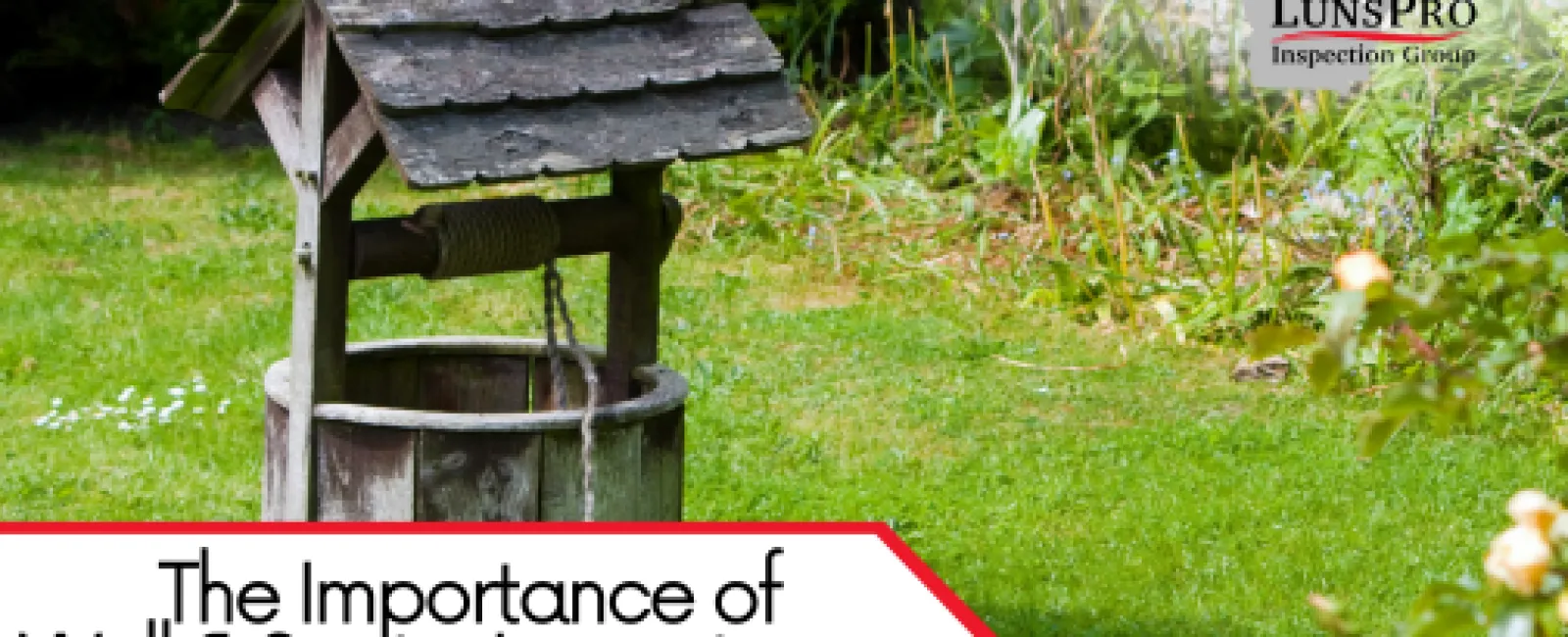Owning a rural home offers a sense of peace and independence that's hard to find in urban or suburban environments. With more land, fewer neighbors, and often a slower pace of life, rural living appeals to many across the Carolinas. However, that independence comes with unique responsibilities—particularly when it comes to essential utilities like water supply and waste disposal. Unlike homes in municipalities that rely on public water and sewer systems, rural homes typically operate on private wells and septic systems. For homeowners and prospective buyers, understanding the condition and functionality of these systems is not just beneficial—it's essential.
Without regular inspections, well and septic systems can silently fail, resulting in water contamination, foul odors, soil pollution, foundation problems, and costly repairs. For residents in the Triad and Triangle Areas, where rural properties are common, an inspection from a trusted provider like LunsPro Inspection Group can offer peace of mind. Whether you're purchasing a home with existing systems or maintaining the property you've owned for years, Charlotte, Greensboro, and Raleigh Residential and Commercial Inspections play a critical role in protecting both your investment and your health.
What Is a Well and Septic Inspection?
A well and septic inspection is a specialized evaluation designed to assess the condition, safety, and functionality of a home's private water and wastewater systems. These inspections go beyond a basic visual check, often involving testing, probing, and the use of diagnostic tools to determine system integrity.
A well inspection typically includes:
-
Evaluating the physical condition of the wellhead and components
-
Measuring the water flow rate and pressure
-
Checking the pump and pressure tank
-
Testing water quality for contaminants like coliform bacteria, nitrates, and heavy metals
-
Reviewing past maintenance records, if available
A septic inspection involves:
-
Locating the septic tank and drain field
-
Opening and assessing the tank's interior with visual or camera tools
-
Measuring sludge and scum levels to determine the need for pumping
-
Inspecting baffles and filters
-
Checking for signs of backups or drainage failures
-
Evaluating drain field performance and soil saturation
These inspections are especially important during real estate transactions, as they can impact a home's value and insurability. For existing homeowners in Carolina home inspections, periodic evaluations ensure that systems continue operating safely and efficiently over time.
Why These Inspections Are Crucial in Rural Carolina Properties
Rural areas in North Carolina—including the Triad and Triangle Areas—are dotted with homes that are not connected to city water or sewer infrastructure. In these communities, well and septic systems are the only source of drinking water and waste management. That means any failure in the system could directly affect the home's livability and the surrounding environment.
Key reasons these inspections are vital include:
-
Health and Safety: Contaminated well water can carry harmful bacteria, nitrates, or even arsenic, posing a direct threat to your family's health. A failed septic system can release untreated waste into the yard, leading to unpleasant odors, environmental damage, and potential health hazards.
-
Property Value Protection: A malfunctioning system can quickly devalue a home. If issues are discovered after the purchase, they often lead to expensive repairs or replacements. Buyers and sellers alike benefit from upfront knowledge of system performance.
-
Foundation Integrity: Poorly functioning septic systems can cause soil saturation around the home's foundation. Over time, this excess moisture can lead to foundation cracks, structural shifting, and basement water intrusion—issues that Carolina homeowners are particularly concerned about.
-
Legal and Insurance Compliance: In many counties across North Carolina, a septic inspection is required as part of the property transfer process. Lenders and insurance companies may also mandate testing and certification before approving a mortgage or policy.
Common Issues Found in Well & Septic Systems
Rural homes in the Charlotte, Greensboro, and Raleigh areas may be decades old and equipped with original systems that have never been upgraded. Regular inspections by experienced professionals—such as those at LunsPro Inspection Group—can uncover common problems, including:
In Wells:
-
Deteriorated well casings
-
Cracked or poorly sealed well caps
-
Submersible pump failure
-
Pressure tank leakage
-
Low water pressure or insufficient yield
-
Bacterial or chemical contamination
In Septic Systems:
-
Cracked septic tanks
-
Tree root infiltration in lines
-
Blocked or failing leach fields
-
Excessive sludge build-up
-
Overflowing tanks or backup in plumbing
-
Ground saturation above the drain field
Unaddressed, these issues can progress from inconveniences to full system failures. That's why Carolina home inspections should never overlook these critical components—especially for rural buyers unfamiliar with their operation and maintenance.
How Often Should You Inspect Well and Septic Systems?
The North Carolina Department of Health and Human Services recommends that homeowners inspect and maintain their septic systems every 3-5 years, depending on household size and water usage. Wells, on the other hand, should be tested for water quality annually—even more often if there are young children, elderly residents, or immune-compromised individuals in the household.
During a real estate transaction, both the buyer and seller should agree on professional third-party inspections for both systems. The cost of inspection is minimal compared to the cost of replacing a contaminated well (which can exceed $10,000) or rebuilding a failed septic drain field (which may run $5,000-$15,000 or more).
LunsPro Inspection Group, with its extensive experience in Charlotte, Greensboro, and Raleigh Residential and Commercial Inspections, offers well and septic evaluations tailored to rural homes, ensuring you have an accurate picture of what lies beneath your property.
What to Expect During the Inspection Process
The process of inspecting well and septic systems typically takes several hours, depending on the property layout and accessibility. Here's what you can expect:
-
Initial Consultation: The inspector reviews the property's history, age of systems, and known issues.
-
System Location: Many rural properties lack clear documentation, so locating tanks, lines, and wells can be a critical early step.
-
Testing and Evaluation: Water samples are collected, tank levels are measured, and visual or camera scopes are used.
-
Drain Field Inspection: The soil is probed to determine saturation and functionality.
-
Reporting and Recommendations: A detailed report outlines current system conditions, deficiencies, and recommended next steps.
LunsPro Inspection Group provides clear, easy-to-understand findings and expert guidance on what actions may be needed to bring your systems up to standard.
Specialized Concerns for the Triad and Triangle Areas
Each region in North Carolina has its own challenges when it comes to water tables, soil conditions, and terrain. For example:
-
In the Triad, dense clay soils can lead to poor percolation in septic drain fields, increasing the risk of saturation and failure.
-
In the Triangle, rapid development can impact groundwater quality and lead to well drawdown if neighboring wells are added.
-
In Charlotte and surrounding counties, aging infrastructure in older homes often lacks documentation, making inspections even more important.
A knowledgeable inspector from LunsPro Inspection Group can help identify risks specific to your location, providing homeowners with regionally-relevant insights and preventative solutions.
The Role of Inspections in Real Estate Transactions
Well and septic inspections are often deal-makers or deal-breakers during home sales. Many buyers—especially those moving from city homes with public utilities—aren't aware of how these systems work, let alone how to maintain them. Having a recent inspection report available can:
-
Increase buyer confidence
-
Reduce closing delays
-
Prevent post-sale disputes
-
Help justify the asking price
Sellers can proactively schedule inspections before listing to avoid surprises and position the home as a well-maintained property. For buyers, insisting on inspections during due diligence protects your future investment from costly repairs.
For rural homeowners in North Carolina, well and septic systems are vital parts of everyday life. Unlike public utilities, these systems are privately owned and must be proactively maintained to function safely and efficiently. A failure in either can result in significant health risks, environmental damage, and even compromise the structural integrity of your home—especially when excess moisture affects your foundation.
That's why well and septic inspections are not just a best practice—they're a necessity. Whether you live in the Triad, Triangle, or greater Charlotte area, LunsPro Inspection Group offers the specialized experience and technology needed to assess your rural property systems with precision and professionalism. Their work through Charlotte, Greensboro, and Raleigh Residential and Commercial Inspections provides Carolina homeowners with reliable, fact-based evaluations tailored to the region's unique landscape and conditions.
Don't wait for problems to surface. Schedule a professional well and septic inspection today and ensure the safety, functionality, and value of your rural property for years to come. With LunsPro Inspection Group, Carolina home inspections are more than routine—they're your first line of defense in protecting your home's most vital systems.

